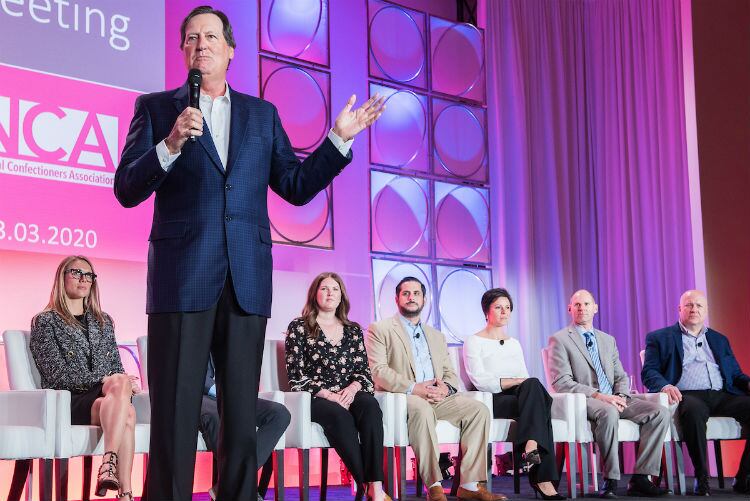John Downs, president and CEO of the National Confectioners Association (NCA), said the organization is a showcase for the US economy and at its annual meeting held in Florida at the beginning of March, he revealed a new strategic plan, Thrive in 25, which maps out its route for the next five years.
Downs pushed for the NCA’s future leaders to be the architect of Thrive in 25: “Who better to plan for the future than those who will be in charge of seeing us through it?,” said Kirk Vashaw, chairman & CEO, Spangler Candy Co and chairman of the NCA Board of Trustees.
The idea was to predict what the confectionery industry will look like in five years’ time and the future leaders spent over six months focusing on areas of disruption that Byard Ebling, unit manager/client development manager at Shankman & Associates, Inc, said: “will have significant disruption to potentially impact positively and negatively on our companies in future.”
He told members the review of NCA's mission, vision and strategic goal areas was to make sure the NCA's work is truly supportive of a thriving confectionery industry by 2025. “It should be more external facing, more positive, with a focus on innovation and growth, with explicit focus on identifying user trends and disruptions and helping the industry respond to them.”
We want to be part of consumers’ lifestyles and champions of sustainability -- Lana Jones, brand manager, Haribo of America, Inc
Lana Jones, brand manager, Haribo of America, Inc, said the candy industry should become more consumer-centric and focus on being more diverse to represent the diversity among consumers. “We have to be even more relevant to consumers with great products in the right place at the right time and continuing to adapt and respond to consumer trends.”
She said that by 2025 a thriving and successful confectionery industry will be more relevant to consumers by being more innovative, transparent and sustainable. “Business practices, sustainable farming, transparency in terms of ingredients and sourcing – are all more important to our consumers than ever before.”
The NCA needs to be authentic, trustworthy and impactful. “We want to be part of consumers’ lifestyles and champions of sustainability,” she said.
Dynamic industry
Sarah Atkinson, marketing manager, Atkinson Candy Company, said the future leadership team of the NCA was ready to be transformed into something more forward looking, more aspirational and reflective of a dynamic industry. “A fostering environment is core to the NCA's purpose, and it should enable candy makers to thrive and promote the unique role of confectionery in a happy, balanced lifestyle,” she said.
Atkinson told members candy holds a special place in consumers lives and provides 600,00 jobs to US economy. “If you are going to be consumer-centric you have to have their trust, which means transparency, integrity and authenticity, it's about diversity and collaboration - if you want to go forward you go together.”
Main trends that are going to impact the confectionery in the near future are; CBD infusions, sustainability, consumer demands and the war on sugar, said Anthony Trani, vice president, Global Marketing, Topps Confections, Bazooka Candy Brands. He applauded the new National Candy Month initiative and said the future leaders will routinely monitor the landscape for future trends and disruptions every three, five and 10 years - and will make recommendations to the NCA leadership to help the industry effectively navigate them.
CandyPAC
The NCA is recognized as an effective mission-driven advocacy organization and uses CandyPAC as one of its most important tools to get the industry heard by lawmakers in Washington.
Elise Fennig, the NCA’s chief of staff & senior vice president of operations, said the next five years will be about continuing to engage policy makers, opinion leaders and influencers to further strengthen the NCAs position as 'the thoughtful leading voice of the confectionery industry'. “We will generate necessary resources and manage them effectively to achieve our goals,” she confirmed to members.
‘The NCA can also be a force for good’
The NCA can not only be a force for change, but a force for good, Paul Polman, co-founder and chair, IMAGINE, a benefit corporation and foundation accelerating business leadership to achieve the UN’s global goals for sustainable development, told members in a follow-on session after its annual meeting.
“Everyday we have something new thrown at us, be it a geo-polical challenge or the coronavirus, climate change or carbon emissions and plastics in packaging … the confectionery industry is not excluded from that.”
Companies that don’t serve society are not going to last long, he said. The financial crisis of 2007-2008, when Polman became CEO of Unilever, led to more transparency in companies, and the realisation that rapid growth, subsequent debt and inequality was clearly not a system that was sustainable, he said.
“We have some serious challenges in the US – climate change and income inequality are the biggest we need to solve. We have done more damages to the planet in the way we treat our resources in the past 20-30 years than in the whole history of mankind.
“If you are a cocoa farmer in Africa or any of the producer countries it’s a struggle to support your family and children, many of the underlying reasons for poverty can be traced back to climate change.
He said 60 million Americans are $600 away from poverty, the poorest in this world are getting poorer, while the super wealthy saw their net growth increase by 12% - $900bn more in net wealth.
From waste reduction and climate change to social responsibility and supply chain transparency, sustainability is a driving force for many consumers and a top priority for industry – and our planet’s future, he told NCA members.




